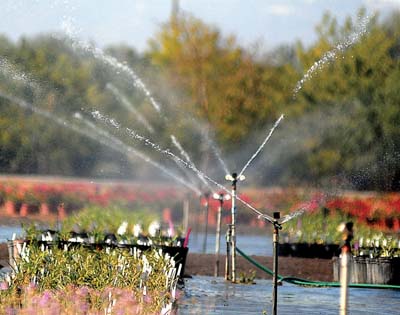The San Benito County Water District on Tuesday voted unanimously to issue a resolution declaring an emergency water shortage condition in the county and impose a fee for water overuse.
“This is voluntary conservation with a goal of 15 percent reduction (in water usage),” said District Manager Jeff Cattaneo at Tuesday’s meeting.
He said that normally around this time, the county receives 6 to 7 inches of rain. So far this year there have been 1.86 inches.
“It’s created a situation where we’re in a severe water shortage for our district,” he said.
He said there was also a 20 foot decline in groundwater levels around Hollister.
“If we continue that for the next three to four years, we’ll be back down to historic lows” not seen since 1977, he said.
According to the National Drought Mitigation Center, Central Valley counties, including parts of Santa Clara, Santa Cruz, Monterey, Merced, Fresno and the entire county of San Benito, were recently reevaluated by the center as dealing with “exceptional drought” conditions, the most intense measure of drought severity and the most severe in 14 years.
The resolution would also call for an “overuse fee” for blue valve water around the district.
He said the fee would not affect most consumers and would help to cover the cost of the water shortage.
“There’s probably going to be 3 to 4 percent of the customer base over-using that water,” he said.
The fee would not apply to residential water users but would apply to ranchers, farmers and others who use large amounts of water on a daily basis. The resolution goes into effect immediately.
The fee would be $1,200 per acre-foot of water over the limit, he said.
“It’s not intended to be a punitive action,” he said. “It’s intended to give them incentive to watch water use.”
Supervisor Anthony Botelho said the county board is “very concerned” about the effects of the fees on agricultural industry and residents in rural areas.
“As a county, we certainly want to support the water district in their efforts to urge people to conserve,” he said in a phone interview Wednesday. “People will need to get in a habit of conserving.”
Drought conditions have plagued California farmers and ranchers in the past three years, forcing farmers to cut harvest, uproot fields and rely on groundwater and wells for water use, including farmers ranchers in San Benito County. This year, the drought has spurred ranchers to sell most – and sometimes all – of their livestock in January instead of June or July as in a typical year.
Hollister, for instance, had its driest conditions on record in 2013, with just over 4 inches of rain falling the entire calendar year. Last month, Gov. Jerry Brown declared a drought emergency in the state and has asked residents to try to reduce water use by 20 percent. In late January, state officials announced that local agencies would not be receiving water from the State Water Project operated by the California Department of Water Resources due to the drought.
In a press conference Wednesday, Brown reiterated his call to have “citizens do their part” to conserve water.
“This is a time to pool together as Californians first,” he said. “Most of the problems we deal with are caused by other human beings. This is about the nature of reality itself.”
The press conference was to announce nearly $700 million in state funds to be used to provide funds to shovel-ready water projects, money for poor and low-income communities to purchase water, and money to farmers and ranchers to help provide water for crops and livestock, among other actions.
It is not known whether the proposed legislation would affect the water district’s decision from Tuesday. Legislators said the package would take several weeks to negotiate and pass before going to the governor’s desk for approval.
“It’s a drought,” Cattaneo said. “On the open market, there’s going to be very little water.”
Botelho said the problem for the agricultural community and the county is that nobody knows how long the drought will last.
“We continue to do what we can to extend water resources,” he said. “WIthout water, you have no agricultural industry. It’s a bad situation for everybody.”










